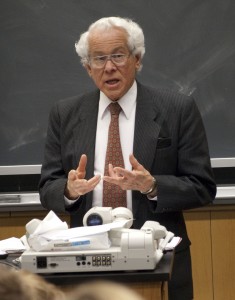
Will Freiert has spent the last 38 years teaching his students to interpret the world. At the end of the academic year, Freiert will retire.
Every culture borrows from the one that came before it, the professor of classics explained, and so to understand where we are today, it is vital we understand where we came from. “There’s an ethos about a national liberal arts college that classics is central to the core mission—and if you look at the 100 best liberal arts colleges in the country, you’ll find very few that don’t have classics as a separate department,” Freiert said.
In 1979, he and three other professors worked to establish an independent classics department, transforming Gustavus into a high-profile liberal arts college.
Classics, Freiert explained, is less about studying the past and more about interpreting our modern lives. “Latin and Greek give you an intuitive sense of being able to make distinctions and perceive complexity,” Feiert said. One of his mantras is “reality is sacred”—that people should be aware of what they are doing, where they are and what their impact is in the world. All of Western culture is built on a Greco-Roman foundation, and studying classics is a way to understand our culture.
In his Apology Socrates said,“The unexamined life is unlivable.” It is this perspective—as rational beings, we have the responsibility to explore and understand our lives—that is constantly present in what Freiert teaches. He tries to help students wake up to the reality around them and to give them the tools they need to examine it.
“Freiert taught me that our personal stories and shared myths are manifestations of our values and beliefs in a form that is outside our typical rationalized thought,” Senior Political Science Major Nick Harper said.
Freiert’s interests in classics extend beyond the traditional Western philosophers. While Eastern and Western philosophy have different core tenets, Freiert sees them as different ways of approaching the same reality. In the early 1990s, he developed an interest in Japanese philosophy and taught at the Japanese Kansai Gaidai University in 1992. Five years later he returned to Japan as a Fulbright lecturer at Tohoku University.
“I tell students, ‘These are the best four years of your life,’” Freiert said. “All you have to do is figure out what’s important for you and what your values are.”
He finds that Gustavus nurtures the Lutheran value that there are no questions that should not be asked. Students here can talk about things “that they would feel embarrassed to talk about in a state school,” he said. This openness is what has allowed the spirit of scholarship and exploration to thrive at Gustavus.
“Freiert is a great, young soul with a sagacity that I’ve never encountered before and that is truly inspirational,” Harper said.
In his time at the college, Freiert has had a lasting impact on the lives of many people. At 5:00 p.m. on Saturday, May 8 there will be a lecture honoring the professor followed by a banquet at 6:00 p.m.